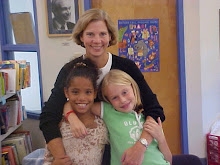Three great dinner table questions for kids of any age come from writer Meg Conley in Huff Post -
How were you brave today?
How were you kind today?
How did you fail today?
The fall back parent question, "What did you do in school today?" often elicits the fallback kid response, "Nothing." or "Stuff." I can only imagine what kind of discussions and conversation could come from these far more revealing questions, and also the opportunity to talk about failure as a positive consequence of trying something new or taking a risk.
I'm going to give it a try when school starts, and see what responses I get from Parker kids. I think I'll also try answering these for myself!
Tuesday, August 30, 2016
Friday, August 26, 2016
The glow of learning
Have we forgotten how children learn? Valerie Strauss in the Washington Post thinks so. Her article, What the modern world has forgotten about children and learning has much terrific food for thought and discussion.
She says, Watch your child's eyes, what makes them go dull and dead, what makes them brighten, quicken, glow with light. That is where learning lies. That can be our guide for every day at school - the glow in children's eyes tells us how we are doing as educators.
Talk to gifted scientists, writers, artists, entrepreneurs. You will find they learned through keen observation, experimentation, immersion, freedom, participation, through real play and real work, through the kind of free activity where the distinction between work and play disappears.
When I watch children at Parker, I see the brightness of excitement and I hear and feel the energy and passion. It is the secret of an effective school - one where people say "your graduates are the best, brightest and most interesting people!"
She says, Watch your child's eyes, what makes them go dull and dead, what makes them brighten, quicken, glow with light. That is where learning lies. That can be our guide for every day at school - the glow in children's eyes tells us how we are doing as educators.
Talk to gifted scientists, writers, artists, entrepreneurs. You will find they learned through keen observation, experimentation, immersion, freedom, participation, through real play and real work, through the kind of free activity where the distinction between work and play disappears.
When I watch children at Parker, I see the brightness of excitement and I hear and feel the energy and passion. It is the secret of an effective school - one where people say "your graduates are the best, brightest and most interesting people!"
Tuesday, August 16, 2016
Social pain/social gain
The social waters that children navigate are tricky and the modelling and practice that happen in the immersed social world of school (and camp!) is crucial. Social pain makes us stronger and fuller people when social skills are part of the curriculum.
I love what author Rick Ackerly suggests: instead of parents asking "How was school today?" they can ask "Solve any social problems today?" Try this with any age group and you are sure to get into some interesting discussions!
Subscribe to:
Posts (Atom)





